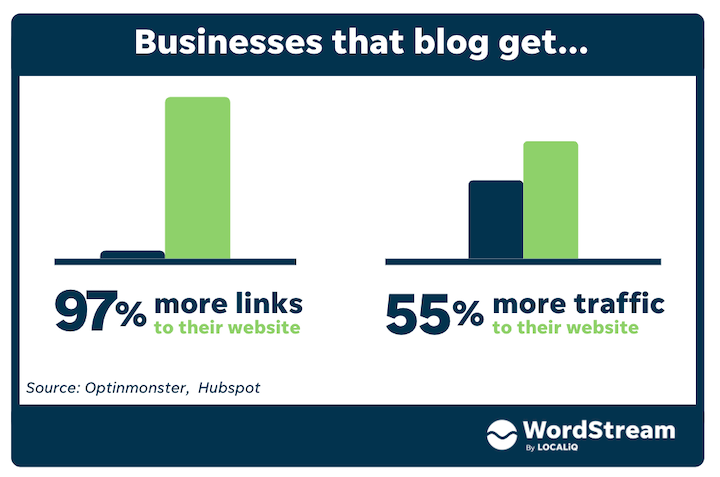
is a powerful strategy that can significantly increase the amount of traffic to your website. In this article, you will learn about the basics of SEO marketing and how it can help drive more visitors to your site. We will cover topics such as keyword research, on-page optimization, link building, and the importance of high-quality content. By implementing these techniques, you will be able to improve your website’s visibility in search engines and attract more potential customers.
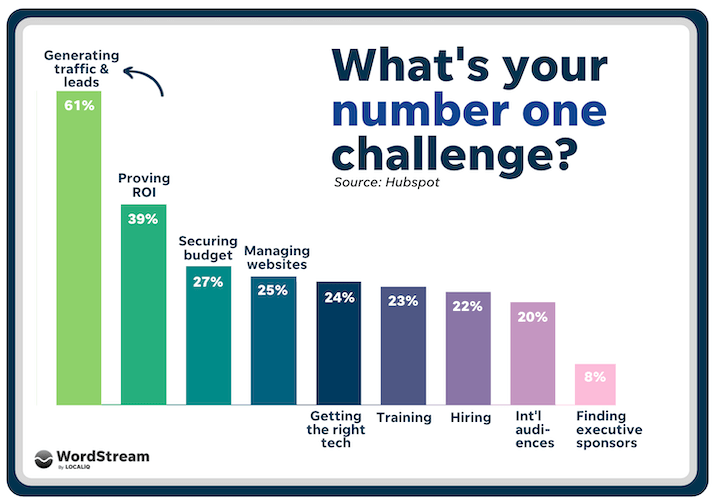
This image is property of www.wordstream.com.
Understanding SEO Marketing
SEO, or Search Engine Optimization, is a crucial tool in today’s online marketing landscape. It plays a significant role in driving traffic to websites, increasing online visibility, and ultimately generating more leads and sales. In this article, we will delve into the importance of SEO marketing, how it works, and the benefits it can bring to your website.
Importance of SEO Marketing
In the highly competitive online marketplace, having a strong online presence is vital for businesses of all sizes. In order to stand out from the crowd and attract potential customers, it is important to rank well in search engine results. This is where SEO marketing comes into play.
SEO marketing helps businesses improve their search engine rankings, which directly translates into increased website visibility. When potential customers search for products or services related to your industry, you want your website to appear at the top of the search results. By implementing effective SEO strategies, you can drive more organic traffic to your website and increase your chances of converting visitors into customers.
How SEO Marketing Works
SEO marketing involves various techniques and strategies to optimize a website for search engines. The goal is to make your website more attractive and relevant to search engines, which will result in higher rankings and increased visibility. Here are some key components of SEO marketing:
Keyword Research: This is the foundation of any successful SEO campaign. Keyword research involves identifying the most relevant and popular keywords or phrases that your target audience is likely to use when searching for products or services similar to what you offer.
On-Page Optimization: This includes optimizing various on-page elements of your website such as titles, meta descriptions, headings, and content. By incorporating targeted keywords into these elements, you can improve your website’s relevance to search queries.
Backlink Building: Backlinks are links from other websites that point back to your site. Search engines consider backlinks as a vote of confidence and authority for your website. Building high-quality backlinks from reputable and relevant websites can improve your search engine rankings and increase your website’s visibility.
Benefits of SEO Marketing
Implementing effective SEO marketing strategies can bring numerous benefits to your website and business. Here are some key advantages:
Increased Organic Traffic: By improving your search engine rankings, more potential customers will be able to find your website organically. This means higher visibility and a greater chance of attracting relevant traffic to your site.
Improved User Experience: SEO marketing involves optimizing various aspects of your website, such as site speed, navigation, and mobile responsiveness. By providing a seamless and user-friendly experience, you can increase engagement and satisfaction among your visitors.
Long-Term Results: Unlike certain forms of paid advertising, SEO marketing provides long-lasting results. Once you achieve high rankings in search engine results, you can continue to enjoy increased visibility and traffic for an extended period of time.
Cost-Effective Marketing: SEO marketing is a cost-effective marketing strategy compared to traditional forms of advertising. While it may require an initial investment, the long-term benefits and return on investment can be significant.
Creating an Effective SEO Strategy
Now that you understand the importance and benefits of SEO marketing, let’s explore how you can create an effective SEO strategy for your website.
Conducting Keyword Research
Keyword research is the foundation of any successful SEO strategy. Start by identifying the keywords and phrases that your target audience is likely to use when searching for products or services similar to what you offer. There are various keyword research tools available that can help you discover relevant keywords with high search volume and low competition.
Optimizing On-Page Elements
On-page optimization involves optimizing various elements on your website to make them more search engine-friendly. This includes optimizing page titles, meta descriptions, headings, and content. Incorporate your targeted keywords naturally into these elements, ensuring they are relevant and provide value to your visitors.
Building High-Quality Backlinks
Building high-quality backlinks is a crucial aspect of SEO marketing. Focus on acquiring backlinks from reputable and relevant websites within your industry. This can be achieved through various methods such as guest blogging, influencer outreach, and social media engagement.
On-Page SEO Techniques
In addition to the overall SEO strategy, optimizing specific on-page elements is essential to improve your website’s search engine visibility. Here are some key on-page SEO techniques:
Optimizing Page Titles and Meta Descriptions
The page title and meta description are displayed in search engine results and act as a preview of your webpage’s content. Optimize your page titles and meta descriptions with relevant keywords and compelling language to entice users to click through to your site.
Creating Relevant and Engaging Content
Content is king when it comes to SEO marketing. Create relevant and engaging content that provides value to your target audience. Incorporate targeted keywords naturally throughout your content without overstuffing. Also, consider adding multimedia elements such as images and videos to enhance user experience.
Implementing Proper Header Tags
Header tags, such as H1, H2, and H3, help search engines understand the structure and hierarchy of your content. Use header tags strategically to divide your content into logical sections and make it easier for search engines to index and categorize.
Off-Page SEO Techniques
While on-page optimization focuses on optimizing elements within your website, off-page SEO techniques involve actions taken outside of your website to improve its search engine rankings. Here are some key off-page SEO techniques:
Developing a Strong Link Building Strategy
Building high-quality backlinks is crucial for improving your website’s authority and trustworthiness in the eyes of search engines. Focus on acquiring backlinks from authoritative and relevant websites within your industry. This can be achieved through various methods such as guest blogging, influencer outreach, and engaging with industry-specific communities.
Guest Blogging and Influencer Outreach
Collaborating with influential bloggers and industry experts can help increase your website’s visibility and reach a wider audience. Guest blogging on reputable blogs within your niche can provide valuable backlinks and establish you as an authority in your industry.
Leveraging Social Media for SEO
Social media platforms can play a significant role in driving traffic to your website and improving your search engine rankings. Regularly share your website’s content on social media platforms, engage with your audience, and encourage social sharing to increase your online visibility.
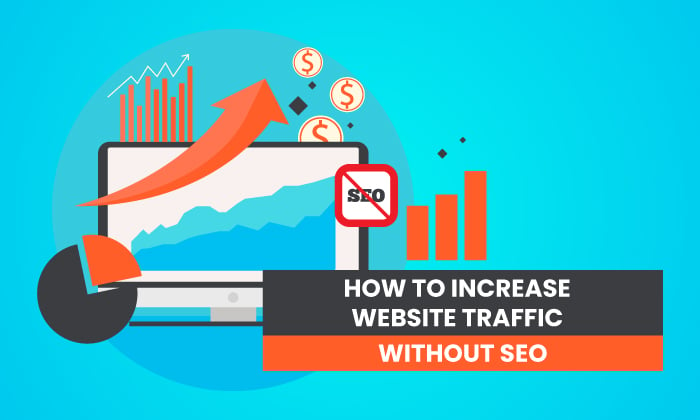
This image is property of neilpatel.com.
Local SEO
If your business has a physical location or serves customers in specific geographic areas, local SEO is essential. Local SEO focuses on optimizing your website to appear in local search results. Here are some key aspects of local SEO:
Importance of Local SEO
Local SEO is crucial for businesses that rely on local customers. By optimizing your website for local search queries, you can increase your visibility among potential customers who are most likely to visit your physical location.
Optimizing Google My Business Listing
Setting up and optimizing your Google My Business listing is essential for local SEO. Ensure your business information is accurate and consistent across all online directories. Encourage customers to leave reviews, as positive reviews can boost your rankings in local search results.
Acquiring Local Citations
Local citations are online mentions of your business’s name, address, and phone number (NAP) on various websites and directories. Acquiring local citations from reputable sources can help improve your local search rankings.
SEO Analytics and Reporting
To measure the effectiveness of your SEO efforts and track your progress, it’s important to analyze and report on your SEO data. Here are some key aspects of SEO analytics and reporting:
Tracking Keyword Rankings
Regularly monitor your keyword rankings to determine how well your website is performing in search engine results. Identify any fluctuations and use this data to make informed decisions and adjustments to your SEO strategy.
Analyzing Organic Search Traffic
Analyze the organic search traffic to your website to gain insights into the keywords, landing pages, and user behavior that contribute to your website’s performance. This data can help you optimize your content and improve your conversion rates.
Monitoring Conversion Rates
Conversion rate tracking is essential to determine the effectiveness of your SEO efforts in driving relevant traffic and generating leads or sales. Monitor your conversion rates and make adjustments to your SEO strategies and website content accordingly.
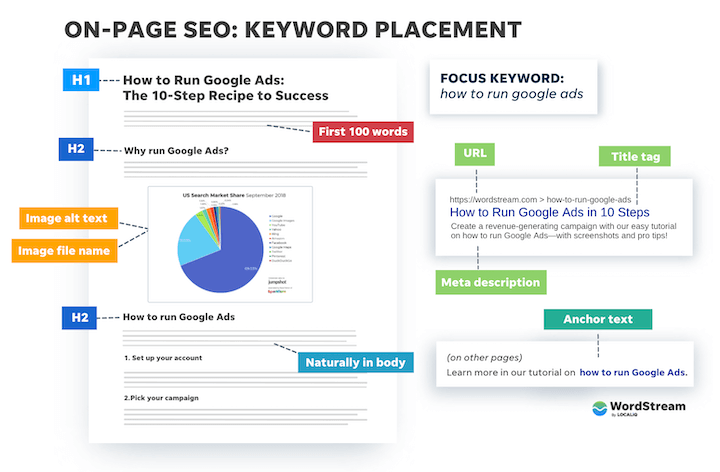
This image is property of www.wordstream.com.
Mobile SEO Optimization
With the increasing use of mobile devices, optimizing your website for mobile search is crucial. Here are some key aspects of mobile SEO optimization:
Responsive Website Design
Ensure your website has a responsive design that adapts to various screen sizes and resolutions. This will provide a seamless and user-friendly experience for mobile users and improve your search engine rankings.
Optimizing Site Speed for Mobile
Mobile users expect fast-loading websites. Optimize your website’s speed for mobile devices by minimizing file sizes, compressing images, and using caching techniques. This will not only improve user experience but also contribute to better search engine rankings.
Optimizing for Voice Search
As voice search becomes increasingly popular, optimizing your website for voice queries is essential. Focus on incorporating conversational and natural language into your content. Consider using structured data markup to provide search engines with specific information that can be featured in voice search results.
Technical SEO
Technical SEO involves optimizing various technical aspects of your website to improve its search engine rankings and user experience. Here are some key aspects of technical SEO:
Improving Website Loading Speed
A fast-loading website is essential for both user experience and search engine rankings. Optimize your website’s speed by minimizing file sizes, reducing server response time, enabling browser caching, and optimizing code.
Ensure your website has a clear and intuitive site structure and navigation. Utilize internal linking to establish a hierarchy of pages and help search engines understand the relevance and importance of each page.
Fixing Duplicate Content Issues
Duplicate content can negatively impact your search engine rankings. Identify and rectify any duplicate content issues on your website. Use canonical tags to indicate the preferred version of a page to search engines.

This image is property of www.searchenginejournal.com.
SEO Tools and Resources
Various tools and resources are available to assist you in implementing and monitoring your SEO efforts. Here are some key SEO tools:
Keyword Research Tools
Tools such as Google Keyword Planner, SEMrush, and Moz Keyword Explorer can help you identify relevant keywords with high search volume and low competition.
SEO Audit Tools
Tools like Moz, SEMrush Site Audit, and Google Search Console can provide insights into your website’s overall SEO health, identify technical issues, and suggest improvements.
Backlink Analysis Tools
Tools such as Ahrefs, Moz, and Majestic can help you analyze your backlink profile, monitor your competitors’ backlinks, and identify opportunities for link building.
Conclusion
In today’s highly competitive online marketplace, SEO marketing plays a crucial role in driving traffic to your website, increasing visibility, and ultimately generating more leads and sales. By understanding the importance of SEO marketing, implementing effective strategies, and optimizing various on-page and off-page elements, you can drive targeted organic traffic to your website and achieve long-lasting results. Stay up to date with the ever-evolving SEO landscape, track your progress through analytics and reporting, and utilize the available tools and resources to maximize your SEO efforts. With a well-executed SEO strategy, you can drive traffic to your website, gain a competitive advantage, and grow your business in the digital world.
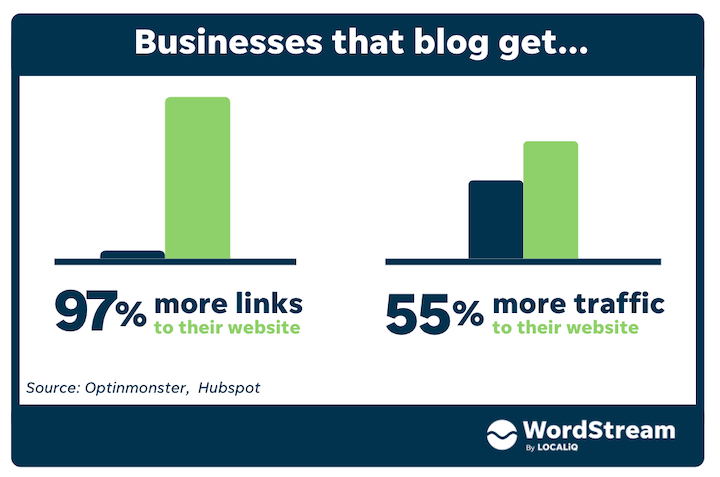
This image is property of www.wordstream.com.

